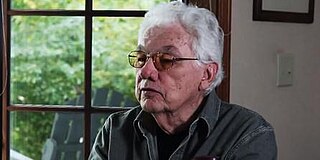Related Research Articles

Shadows is a 1959 American independent drama film directed by John Cassavetes about race relations during the Beat Generation years in New York City. The film stars Ben Carruthers, Lelia Goldoni, and Hugh Hurd as three black siblings, though only one of them is dark-skinned enough to be considered African American. The film was initially shot in 1957 and shown in 1958, but a poor reception prompted Cassavetes to rework it in 1959. Promoted as a completely improvisational film, it was intensively rehearsed in 1957, and in 1959 it was fully scripted.

A Woman Under the Influence is a 1974 American drama film written and directed by John Cassavetes. The story follows a woman whose unusual behavior leads to conflict with her blue-collar husband and family. It received two Academy Award nominations, for Best Actress and Best Director.

Virginia Cathryn "Gena" Rowlands is an American retired actress, whose career in film, stage, and television has spanned seven decades. She is one of the last living actresses from the Golden Age of Hollywood. A four-time Emmy and two-time Golden Globe winner, she is known for her collaborations with her late actor-director husband John Cassavetes in ten films, including A Woman Under the Influence (1974) and Gloria (1980), which earned her nominations for the Academy Award for Best Actress. She also won the Silver Bear for Best Actress for Opening Night (1977). She is also known for her performances in Woody Allen's Another Woman (1988), and her son, Nick Cassavetes's film, The Notebook (2004). In 2021, Richard Brody of The New Yorker said, “The most important and original movie actor of the past half century-plus is Gena Rowlands.” In November 2015, Rowlands received an Honorary Academy Award in recognition of her unique screen performances.

John Nicholas Cassavetes was an American actor, film director, and screenwriter. He began as a television and film actor, before playing a role in pioneering the early 1970s boom in American independent cinema, and writing and directing movies. AllMovie called him "an iconoclastic maverick", while The New Yorker suggested in 2013 that he "may be the most influential American director of the last half century."

Faces is a 1968 American drama film written and directed by John Cassavetes. It stars John Marley, Gena Rowlands, Lynn Carlin, Seymour Cassel, Fred Draper and Val Avery.

Carl Theodor Dreyer, commonly known as Carl Th. Dreyer, was a Danish film director and screenwriter. Widely considered one of the greatest filmmakers of all time, his movies are noted for emotional austerity and slow, stately pacing, frequent themes of social intolerance, the inseparability of fate and death, and the power of evil in earthly life.

The Killing of a Chinese Bookie is a 1976 American neo-noir crime film written and directed by John Cassavetes and starring Ben Gazzara. A rough and gritty film, this is the second of their three collaborations, following Husbands and preceding Opening Night. Timothy Carey, Seymour Cassel, Morgan Woodward, Meade Roberts, and Azizi Johari appear in supporting roles.

Mark Rappaport is an American independent/underground film director and film critic, who has been working sporadically since the early 1970s.

Gordon Hugh Willis Jr., ASC was an American cinematographer and film director. He is best known for his photographic work on eight Woody Allen films, six Alan J. Pakula films, four James Bridges films, and all three films from Francis Ford Coppola's The Godfather series.

Love Streams is a 1984 American film directed by John Cassavetes, in what would be his final independent feature and penultimate directorial project. The film tells the story of a middle-aged brother (Cassavetes) and sister who find themselves relying on one another after being abandoned by their loved ones.

Richard Warren Schickel was an American film historian, journalist, author, documentarian, and film and literary critic. He was a film critic for Time magazine from 1965–2010, and also wrote for Life magazine and the Los Angeles Times Book Review. His last writings about film were for Truthdig.
Gerald Peary is an American film critic, filmmaker, editor of the University Press of Mississippi, and a former curator of the Harvard Film Archive.

Shaky camera, shaky cam, jerky camera, queasy cam, run-and-gun or free camera is a cinematographic technique where stable-image techniques are purposely dispensed with shaking. It is a hand-held camera, or given the appearance of being hand-held, and in many cases shots are limited to what one photographer could have accomplished with one camera. Shaky cam is often employed to give a film sequence an ad hoc, electronic news-gathering, or documentary film feel. It suggests unprepared, unrehearsed filming of reality, and can provide a sense of dynamics, immersion, instability or nervousness. The technique can be used to give a pseudo-documentary or cinéma vérité appearance to a film.

Lelia Goldoni is an American actress who appeared in a number of motion pictures and television shows starting in the late 1940s, including uncredited cameo roles in Joseph L. Mankiewicz's House of Strangers (1949), John Huston's We Were Strangers (1949) and The Italian Job (1969). She appeared as Denise James in the 1965 horror film Hysteria.
Morris Engel was an American photographer, cinematographer and filmmaker best known for making the first good-quality, internationally-recognized American film "independent" of Hollywood studios, Little Fugitive (1953), in collaboration with his wife, photographer Ruth Orkin, and their friend, writer Raymond Abrashkin.

Lovers and Lollipops is a 1956 film directed and written by Morris Engel and Ruth Orkin. The film was photographed on location in and around New York City, and tells the story of the romance of a widowed fashion model and an engineer, and how their relationship is affected by her daughter.

John Cassavetes began his career in film in 1953 and ended it in 1986, between which times he was involved in every aspect of the film, television, and stage arts, including acting, directing, scoring, shooting, editing, producing, and marketing.
Lady Rowlands was an American film actress. Most of her work came in the films of John Cassavetes, who was married to her daughter, the Academy Award-nominated and four-time Emmy Award-winning actress Gena Rowlands.
Minimalist cinema is related to the art and philosophy of minimalism.
Modernist film is related to the art and philosophy of modernism.
References
- ↑ "Ray Carney's Bookstore". About Ray Carney. BU. Retrieved July 17, 2011.
- ↑ Gabler, Neal (August 25, 1985). "Cinema Without Verities". The New York Times . New York, New York. Retrieved July 18, 2021.
- ↑ "Career Overview". About Ray Carney. BU. Retrieved July 17, 2011.
- ↑ "Ray Carney's Carney on Culture: Woody Allen: Excerpted from: A Man of Sentiment: Modernism for the Millions—The Films of Woody Allen". About. BU. Retrieved July 17, 2011.
- ↑ "Ray Carney's Academic Animadversions: Excerpted from: Two Forms of Cinematic Modernism: Notes Towards a Pragmatic Aesthetic". About. BU. Retrieved July 17, 2011.
- ↑ Fake Independence and Reel Truth, Pt. 1: Ray Carney’s incendiary film criticism feels as vital today as it did 15 years ago–MovieMaker.
- ↑ Edgers, Geoff (April 7, 2013). "BU caught in middle as filmmaker, professor feud". The Boston Globe . Retrieved May 22, 2013.
- ↑ Mark Rappaport Fires Back at Ray Carney|Filmmaker.
- ↑ The Strange and Sad Saga of How Mark Rappaport Lost His Movies (And What He Can Do To Get Them Back)|IndieWire.
- ↑ Mark Rappaport Versus Ray Carney: Did This Film Scholar Steal the Work of a Beloved Indie Filmmaker?–Slate.com.
- ↑ Film Festival Rotterdam: Shadows: The First Version CR, Rotterdam, archived from the original on April 1, 2004.